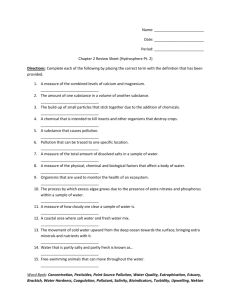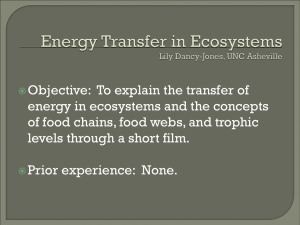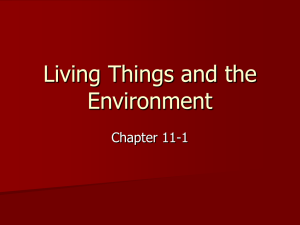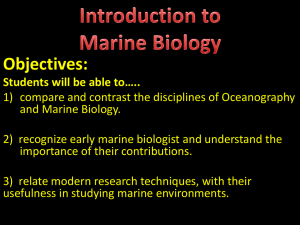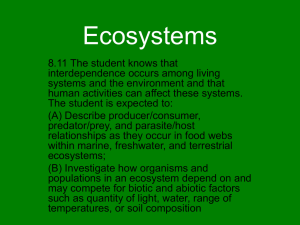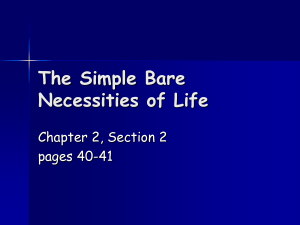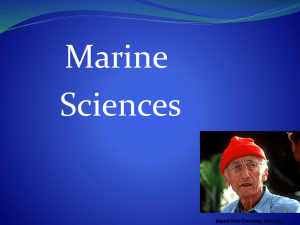Assignments - Lucera Love`s Class
advertisement
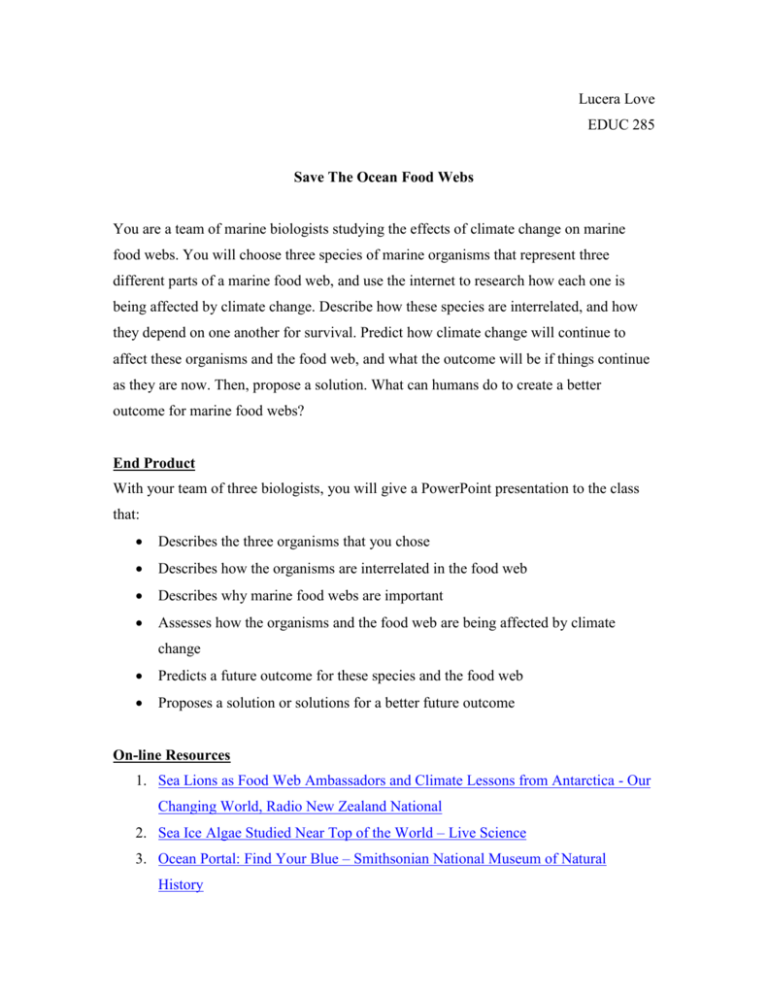
Lucera Love EDUC 285 Save The Ocean Food Webs You are a team of marine biologists studying the effects of climate change on marine food webs. You will choose three species of marine organisms that represent three different parts of a marine food web, and use the internet to research how each one is being affected by climate change. Describe how these species are interrelated, and how they depend on one another for survival. Predict how climate change will continue to affect these organisms and the food web, and what the outcome will be if things continue as they are now. Then, propose a solution. What can humans do to create a better outcome for marine food webs? End Product With your team of three biologists, you will give a PowerPoint presentation to the class that: Describes the three organisms that you chose Describes how the organisms are interrelated in the food web Describes why marine food webs are important Assesses how the organisms and the food web are being affected by climate change Predicts a future outcome for these species and the food web Proposes a solution or solutions for a better future outcome On-line Resources 1. Sea Lions as Food Web Ambassadors and Climate Lessons from Antarctica - Our Changing World, Radio New Zealand National 2. Sea Ice Algae Studied Near Top of the World – Live Science 3. Ocean Portal: Find Your Blue – Smithsonian National Museum of Natural History 4. Climate Change Effects on Ocean Animals – New England Aquarium Impacts of Climate Change on Marine Organisms and Ecosystems – Science Direct: Current Biology 5. Ocean and Climate Literacy: Essential Principles and Fundamental Concepts NOAA Ocean Service Education 6. New England Aquarium – Climate Change and the Oceans 7. University of Wisconsin – How Can I Tell if a Website is Credible? 8. PowerPoint Tutorial Procedure 1. Use the internet to research marine food webs. 2. Identify and choose three different organisms that represent three different parts of a marine food web. 3. Work within your group to make a conclusion about why marine food webs are important. 4. Use the internet to research how each of these organisms and their food webs are being affected by climate change. 5. Given how each of these organisms is being affected by climate change, discuss within your group how you think this affects the food web. 6. Work within your group to make a prediction about the future outcome for these organisms and their food webs. 7. Use the internet to research possible solutions for climate change and marine food webs. 8. Work within your group to create and compile solutions to climate change and its affects on marine organisms and food chains. 9. Work within your group to compile your information and ideas, and create a PowerPoint presentation. 10. With your group, give a 10-minute PowerPoint presentation to the class. Learning Advice When choosing websites for gathering information, look for sites that are credible. Some questions to ask when deciding if the site is credible: Is the institution that is linked with the site well established (e.g. educational institutions whose address ends in .edu, government institutions that end in .gov)? Is the site trying to sell something (i.e. sites that end in .com or .net)? Sites that are trying to sell something have a strong bias, and are more likely to give false information. Is the site bias? Sites ending in .org are often linked with organizations strong political or religious bias. Are the authors’ names listed on the site? A site with an author’s name is more credible. Is there a date on the site? More recent information is usually more credible. Is the site well designed, or does it look professional? Poorly designed websites with spelling and grammar errors should not be trusted. Form your own opinions, make predictions, and draw conclusions based on trusted information and scientific evidence. CA Standards Covered: Digital Literacy, W 6: “Use a variety of age‐ appropriate technologies (e.g. drawing program, presentation software) to communicate and exchange ideas” Environmental Science, 6.5c: “Students know populations of organisms can be categorized by the functions they serve in an ecosystem.” Conclusion In this assignment, students will learn: How to do internet research using credible websites How marine organisms are interrelated in marine food webs How climate change is affecting the organisms and food webs How to make predictions about the future based on current scientific evidence How to create solutions for climate change based on current evidence How to create and present a PowerPoint presentation Future assignments that could build upon this one would include projects that require credible internet research, PowerPoint presentations, science projects, marine projects, and solution-based projects. The next assignment in this class, for example, might be a project that would put students’ solutions into action, and require them to report on the short-term and predicted long-term results. Summary This WebQuest assignment will help students to meet the digital literacy content standards through internet research and the creation PowerPoint presentations. It will help them to meet the environmental science content standards through their research and group discussions about marine organisms, food webs, climate change, and solutionbased thinking activities. Students will develop their deeper-level thinking by: Determining the credibility of the websites they are using for their research Describing how their organisms are interrelated in the food web Describing why marine food webs are important Assessing how the organisms and the food web are being affected by climate change Predicting future outcomes for their organisms and the food web Proposing solutions for a better future outcomes
